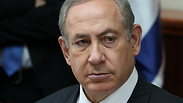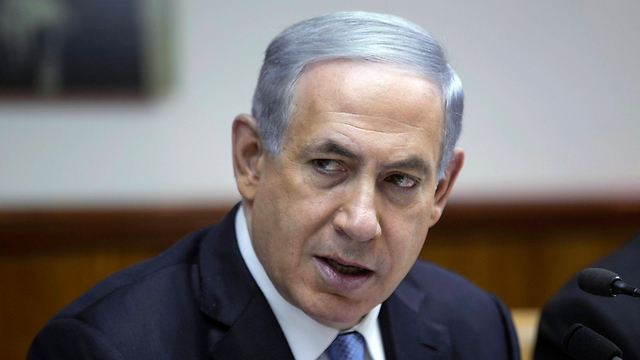
Netanyahu delays West Bank annexation vote
The Security Cabinet led by Prime Minister Benjamin Netanyahu passes 'unaimous' vote to halt implementing Israeli rule on West Bank settlement of Ma'ale Adumim to await Netanyahu's meeting with US President Donald Trump.
Prime Minister Benjamin Netanyahu delayed a vote Sunday on a controversial proposal to annex Ma'aleh Adumim—one of the West Bank's largest settlements—in an apparent effort to align his policy toward the Palestinians with the new administration of President Donald Trump.
The move put on hold legislation that threatens to unleash fresh violence and damage already faded hopes for Palestinian independence. It also may mark Trump's first foray into Middle East diplomacy.
After eight years of frosty relations with President Barack Obama, Netanyahu has welcomed Trump's election as an opportunity to strengthen ties between two allied nations. The two talked on the phone Sunday.
In the conversation, which Trump called "very nice," Netanyahu expressed his vision for the two to work together for regional peace and security without gaps between the US and Israel. They discussed Iran, the political process with the Palestinians and other topics. Trump ended by inviting the prime minister to visit him in Washington in February.
With Trump signaling a more tolerant approach toward the much-maligned settlement movement, many in Israel's right believe they have an ally in the White House.
Education Minister Naftali Bennett, leader of the pro-settlement Bayit Yehudi party, has been pushing Netanyahu to abandon the idea of a Palestinian state and to annex the Ma'aleh Adumim settlement near Jerusalem.
But after convening his Security Cabinet on Sunday, though, Netanyahu said his Cabinet ministers, with Bennett included, decided "unanimously" to delay action until he goes to Washington to meet with Trump. Netanyahu's office said the Cabinet would hold further discussions ahead of the meeting, which is expected in early February.
Earlier Sunday, Netanyahu thanked Trump for his friendship and his inaugural speech pledge to battle radical Islamic militants. He said that in the phone call they would discuss the Israeli-Palestinian conflict, the situation in Syria and the Iranian threat, among other issues.
While there was no explanation for Sunday's delay. But earlier, a Bayit Yehudi party official said Netanyahu had been trying to delay the Cabinet vote at the request of the Trump administration, which did not want to be blind-sided by unilateral Israeli steps. The official spoke on condition of anonymity because he was not authorized to discuss internal coalition negotiations.
Annexing Ma'aleh Adumim, a sprawling settlement of nearly 40,000 people east of Jerusalem, could cause a major clash with the Palestinians and the rest of the international community. To the Palestinians, it would be seen as undermining negotiations. Ma'aleh Adumim is also strategically located in the middle of the West Bank, potentially hindering the establishment of a continuous state.
"If they are serious about making it part of Israel and closing it down, then it is actually cutting the West Bank into two," said Hagit Ofran of the anti-settlement group Peace Now.
While Trump has not expressed an opinion on the annexation, he has signaled a kinder approach toward the settlement movement than any of his predecessors.
Trump also has already said he supports one of Israel's key demands—moving the US Embassy from Tel Aviv to Jerusalem.
The US, like all other countries, maintains its embassy in Tel Aviv, saying the conflicting claims to Jerusalem must be worked out in negotiations.
Trump, however, faces heavy pressure from the Palestinians and Arab countries against moving the embassy. The fate of east Jerusalem, home to ome of the city's most sensitive religious sites, is deeply emotional, and disagreements have boiled over into violence in the past.
The White House dispelled rumors that Trump had imminent plans to announce the move. It said it was only at the "very beginning" of discussing plans to move the embassy.
Palestinian President Mahmoud Abbas has sent a series of messages to Trump urging him not to move the embassy and warning that he would revoke recognition of Israel if the move takes place.
Abbas met Sunday with Jordan's King Abdullah II in Amman. Jordan, which serves as the custodian of Muslim holy sites in Jerusalem, has warned that moving the embassy would cross a "red line." Jordan is a key Israeli and Western ally in the battle against Islamic militants.
"We discussed the possibility of moving the embassy, and we say that if this thing happens, then we have measures that we agreed to implement together with Jordan," Abbas said. "And we hope that the American administration will not do that."
Palestinian official Nabil Abu Rdeneh and condemned the building plans and called on the UN to act. "It is time to stop dealing with Israel as a state above the law," he said.











